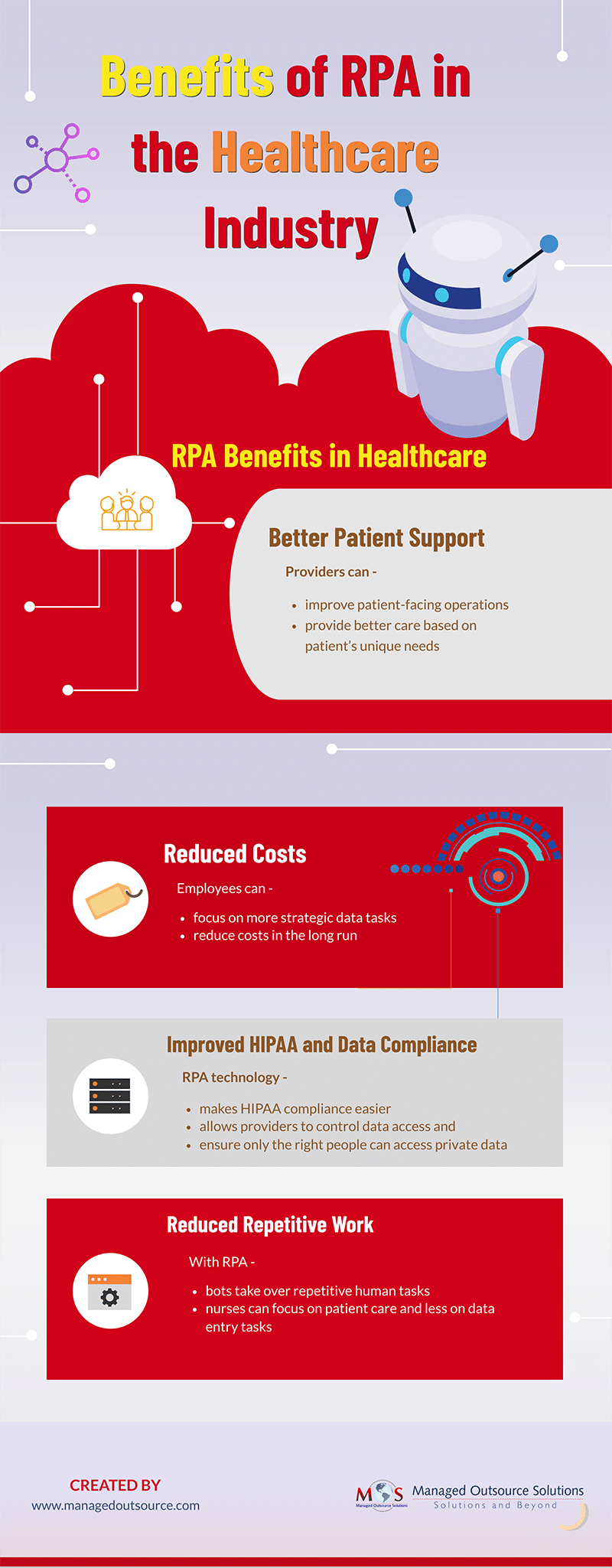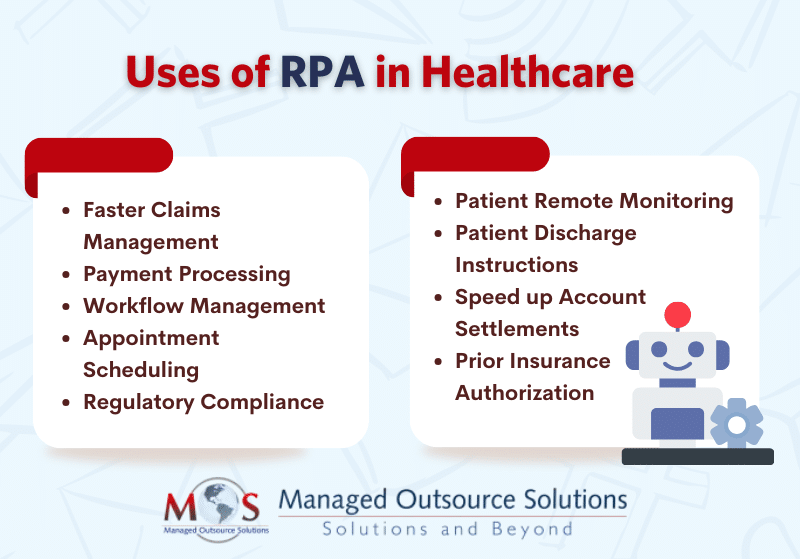The healthcare industry is dealing with rising patient volumes, stringent compliance standards, and increasing operational costs. These challenges have a detrimental effect on overall operations, process management, and the efficiency and quality of patient care. Business process outsourcing companies are now providing robotic process automation (RPA) services to accelerate the digitization process and enhance healthcare workflow.
Implementing digital capabilities like robotic process automation in healthcare can enhance efficiency and improve the patient experience. Right from individual practitioners to healthcare clinics, RPA is being utilized to do away with repetitive, time-consuming tasks, reduce costs, and improve operations. According to a McKinsey study, robotic process automation in healthcare will generate $350 billion to $410 billion in annual value by 2025.
Role of RPA in the Healthcare Industry
Robotic Process Automation refers to technological solutions relating to business process automation using software bots or artificial intelligence workers. The technology uses software to mimic the back-office tasks of human workers, such as extracting data, filling in forms and moving files. As healthcare organizations operate in real-time, cumbersome and error-prone environments, data processing tasks slow down the processes and affect everything – right from cost structures to compliance to the patient experience. In fact, reports suggest that the health sector faces the highest cost per capita from data breaches. At an average of $408 per record, the cost of healthcare data breaches is at least double that of other industry sectors. The high cost of data breaches is primarily due to the high notification costs and steep penalties in the United States for healthcare information mismanagement.
Healthcare firms can benefit from leveraging RPA in conjunction with more sophisticated technologies like artificial intelligence (AI), machine learning (ML), and natural language processing (NLP). Going beyond task automation and labor reduction, this integrated approach allows healthcare firms to tackle higher-level functions that were previously handled by human workers.
Benefits of RPA in Healthcare
- Better Patient Support – RPA allows healthcare providers to improve their patient-facing operations and provide better care in accordance with each patient’s unique needs. The staff can spend more time with patients in person or virtually when they are not as involved in repetitive tasks. This also enables more thorough and personalized care, streamlined patient onboarding, and increased access to the patient record for better decision-making.
- Reduced Costs – With robots handling many arduous and time-consuming data handling tasks, employees can focus on more strategic data tasks. In short, with RPA, healthcare providers can leverage a cost-effective workforce and thereby reduce costs in the long run.
- Improved HIPAA and Data Compliance – As healthcare providers rely on several applications to store patient data, ensuring the confidentiality of data is a complex task. RPA technology makes HIPAA compliance easier. One of the key benefits of RPA is role-based access. By using role-based access, RPA bots allow healthcare providers to control data access and ensure that only the right people are accessing private information. This is particularly important as physicians, IT staff or claims departments all need varying levels of data access.
- Reduced Repetitive Work – With RPA technology, healthcare staff can focus on delivering care rather than entering data. For instance, nurses spend a considerable amount of time monitoring email inboxes or entering information in multiple applications. With RPA, the bots can take over repetitive human tasks. In that way, nurses can focus more on patient care and less on data entry tasks.
- Improves Interoperability: RPA enables healthcare institutions to share previously isolated data between various systems, including electronic health records (EHRs) and electronic medical records (EMRs), offering smooth access to health information and improved patient satisfaction.
- Improves Efficiency – As per reports, health plans spend about $2.1 billion annually on inefficiently performed manual tasks. RPA software robots streamline processes by completing these tasks faster and with more accuracy.
- Enhanced Patient Care Cycle – A positive patient experience is crucial for the growth and well-being of the patient. RPA releases healthcare staff from repetitive tasks and allows them to focus on patient-centered activities and areas that require human connection. Implementation of RPA offers additional benefits like data digitization and patient tracking. These factors ultimately add to the patient benefits and enhance the value-based care experience.
- Streamlined Workflow – Healthcare providers and patients share several similar critical tasks including population wellness, case utilization management, and remote monitoring. The common factor in these tasks is that they are time-consuming and involve repetitive processes – a core area for RPA in healthcare.
Top Use Cases of RPA in Healthcare
The healthcare industry is a complex field involving a system of interconnected procedures, repetitive tasks and multiple players across the value chain. The use of RPA in healthcare accounts for almost 30 percent of the total RPA usage. Generally, RPA scenarios in healthcare can range from no-brainer tasks such as auto-generating replies to emails to supporting single-click installations of complex software systems. It offers excellent potential for improving and streamlining the efficiency of operational and organizational processes.
- Faster Claims Management – Proper claims management is important for the proper functioning of healthcare institutions. According to the United States Census Bureau, more than 90 percent or almost 294 million people in the United States are insured. However, processing these health insurance claims is a challenging job that may involve clerical errors leading to financial pitfalls. According to McKinsey, the use of robotic process automation in medical insurance promises a 30 percent reduction in claims processing costs for companies that automate 60-70 percent of actions associated with claims administration. With RPA implementation, software bots can be programmed to identify compliance and non-compliance-related exceptions and regulations, streamlining the entire process of managing insurance claims.
- Payment Processing – RPA solutions in healthcare can typically work in tandem with claims management and medical coding systems. In order to receive reimbursement from insurance companies, healthcare providers need to source miscellaneous data (including drug and disease codes and entries from patients’ medical history). Apart from automating data aggregation and entry processes, RPA medical tools can improve pricing transparency for patients. For instance, Baylor Scott and White Health (BSWH) — a health system that serves 52 hospitals across the USA — introduced a claims evaluation mechanism driven by RPA and AI. Typically, in healthcare settings, it usually takes revenue cycle employees five to seven minutes to work out how much patients are likely to pay for services before they actually receive care. With intelligent bots, BSWH now manages to produce 70 percent of estimates without the least human involvement. Bots can precisely calculate the bill amount at a faster rate, thereby improving billing efficiency and avoiding payment delays and miscalculated bills.
- Workflow Management – Healthcare institutions handle several day-to-day operations like – case management, discharge, creating and allocating prescriptions, patient admission and claims processing. Implementing RPA helps automate day-to-day business processes. This enables medical practitioners (including physicians and nurses) to focus their attention more on patients.
- Appointment Scheduling – Scheduling and seeing through a complete medical appointment involves several complicated tasks such as collecting the patient’s basic information (including previous medical history), checking for valid insurance policy number, aligning patient appointments with the physician’s on-board schedule and informing patients/physicians about specific changes. Before the COVID-19 pandemic, about 88 percent of appointments were booked manually, extending the gap between an initial referral and actual visit by up to two months. In fact, missed appointments cost US healthcare providers an astounding $150 billion annually. By infusing RPA medical bots into appointment scheduling and patient engagement software, hospitals could eliminate manual data entry. An RPA bot can carry out the above-mentioned processes in a more efficient and quicker manner, thereby reducing operational costs and promoting efficiency.
- Regulatory Compliance – Ensuring compliance with legislative acts and standards and regulating patient health information management is important. For instance, the penalties for HIPAA violations can vary from $1,000 per mild accident to $100,000 for serious breaches. RPA bots ensure that everything they do is tracked, and that the document is logged and systematically stored in well-structured logs. Therefore, any specific report that is required during a healthcare audit for regulatory compliance can be easily sent to the concerned parties. This in turn prepares healthcare enterprises to deal with and handle unprepared and sudden external audits (if any).
- Patient Remote Monitoring – RPA in healthcare offers several benefits like higher accuracy and faster processes. In addition, these benefits improve patient record management. This enables healthcare providers in creating a standardized prognosis plan toward achieving the desired patient health objectives.
- Patient Discharge Instructions – Patients need to correctly follow post-discharge guidelines as it helps better manage their specific health condition. Checking whether each specific patient is correctly following their post-discharge instructions can be a complex task. With RPA bots, healthcare providers can help patients follow discharge guidelines by sending reminders about collecting their prescriptions. In addition, RPA bots can notify patients about upcoming appointments.
- Speed up Account Settlements – RPA in healthcare services speeds up account settlements. Healthcare providers need to effectively monitor patient costs. In addition, they need to make sure that patients don’t fall behind on their payments. They also have to calculate the costs of diagnosis tests, physician fees and other facilities. Manually tracking all these costs and other payments can be time-consuming and prone to human error. RPA bots can correctly determine patient costs and keep track of payments. By leveraging RPA technology, healthcare providers can reduce delays in payments and inaccuracies associated with the calculation of the bill amount.
- Prior Insurance Authorization – RPA and AI technology are used to submit and track requests for prior insurance authorization for procedures, communicating automatically with the patient and all involved constituents, while scheduling the procedure. Insurance authorization submissions are dependent upon proper coding, and AI technology can correctly identify and resolve inconsistencies in submissions caused by manual errors. Approval of coverage for special tests or authorization for treatment is requested electronically, including the cost to the patient, deductibles and other coverage related details, and the response is communicated via auto-generated email.
Read our blog: RPA and Outsourcing: A Winning Combination
Robotic process automation (RPA) is revolutionizing the healthcare sector, thanks to its many benefits such as improved efficiency, reduced cost, better patient care and reduced errors. Implementing new technology does pose certain obstacles, but the benefits far exceed the associated challenges. RPA for healthcare is a win-win situation, as it streamlines the workflow at the physicians’ end while ensuring superior care to the patients. Integrating RPA into your organization is not easy. Working with experienced robotic process automation services can help guide through the process and drive RPA.
Streamline your healthcare operations with cutting-edge RPA solutions!
Explore how our services can enhance efficiency, reduce costs, and improve patient care.






